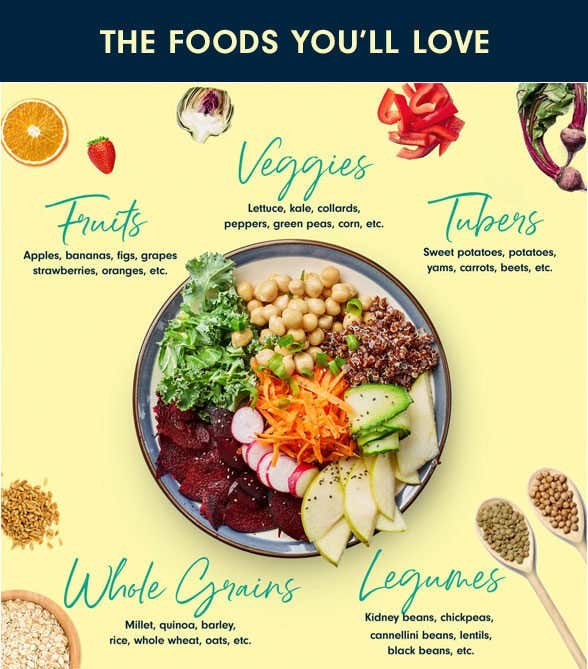Plant Based Beef vs. Traditional Meat: Which Is Better for the Environment?
Wiki Article
All About Healthy Food: Advantages of Embracing Plant Based Options
The conversation surrounding plant-based diet plans has actually acquired substantial interest over the last few years. Many people are discovering the possible wellness benefits, dietary benefits, and environmental effects linked with these dietary selections. As individuals become more mindful of their food's impact on well-being and sustainability, questions emerge concerning the practicalities of adopting such a way of life. What details modifications can one expect, and just how might these options improve not just individual wellness yet also the planet's future?Comprehending Plant-Based Diet Plans
Although numerous individuals link plant-based diet plans generally with vegetarianism or veganism, these diets can incorporate a wide variety of eating patterns that prioritize whole, minimally refined plant foods. Such diet plans commonly consist of fruits, veggies, entire grains, nuts, seeds, and vegetables, while restricting or getting rid of animal products. This versatility enables individuals to tailor their nutritional selections according to individual choices and dietary requirements. Some may adopt a primarily plant-based diet regimen while still occasionally consuming meat or dairy products, typically described as a flexitarian technique. The emphasis stays on incorporating even more plant foods, which can result in a diverse array of dishes and flavors. Recognizing these various interpretations of plant-based consuming is important for appreciating its availability and appeal in modern food society.Health And Wellness Advantages of Plant-Based Foods
The wellness advantages of plant-based foods are considerable, using a nutrient thickness advantage that sustains general health. Research study indicates that these foods can enhance heart health and play a necessary role in effective weight management. By including much more plant-based alternatives, individuals may enhance their nutritional choices and promote lasting health and wellness.Nutrient Thickness Advantage
Nutrient density plays a necessary role in the health benefits of plant-based foods, making them an engaging choice for those seeking a well balanced diet plan. Plant-based foods, such as fruits, vegetables, beans, nuts, and entire grains, are usually rich in important vitamins, minerals, and anti-oxidants while being reduced in calories. This high nutrient density permits individuals to consume less calories while still satisfying their dietary demands. Furthermore, these foods are packed with dietary fiber, advertising digestion health and wellness and assisting in weight management. By integrating nutrient-dense plant-based choices, customers can improve their total health, sustain their body immune systems, and minimize the danger of persistent conditions. Inevitably, the nutrient thickness of plant-based foods highlights their relevance in a health-conscious lifestyle.Heart Health Improvement

Weight Management Assistance
Along with advertising heart health and wellness, a plant-based diet regimen can considerably help in weight management. This nutritional strategy highlights whole foods such as fruits, veggies, beans, nuts, and whole grains, which are normally lower in calories and greater in fiber compared to animal-based items. The high fiber material aids raise satiety, minimizing total calorie consumption. Furthermore, plant-based diets are often rich in necessary nutrients while reduced in harmful fats, making it much easier to maintain a healthy and balanced weight. Plant Based Chicken. Study suggests that individuals that adopt a plant-based way of life tend to have reduced body mass indexes (BMIs) and experience even more effective weight reduction compared to those who eat meat-heavy diet plans. Consequently, accepting plant-based options is a strategic option for efficient weight administration
Nutritional Value of Plant-Based Active Ingredients
Plant-based components are rich in necessary nutrients, supplying a diverse selection of vitamins, minerals, and anti-oxidants that add to general health. A comparison of healthy protein resources discloses that while animal items are frequently watched as superior, numerous plant-based choices give ample protein and various other beneficial compounds. Comprehending the dietary value of these components can useful content assist individuals make notified check my source nutritional options.Necessary Nutrients in Plants
Nutrient-rich ingredients discovered in plants use a varied range of necessary vitamins and minerals that add significantly to total health. These components are abundant in vitamins A, C, and K, which support immune feature, vision, and blood clot, specifically. Furthermore, plants supply important minerals such as potassium, magnesium, and calcium, critical for heart wellness, muscle feature, and bone toughness. The presence of fiber in plant-based foods help food digestion and advertises a healthy intestine microbiome. Anti-oxidants, found generously in vegetables and fruits, aid fight oxidative stress and anxiety and minimize inflammation. Lots of plant foods are reduced in calories yet high in nutrients, making them a superb choice for those looking for to preserve a healthy weight while ensuring ideal nutrient intake.
Contrasting Healthy Protein Resources
Protein resources differ significantly in their nutritional accounts, with plant-based active ingredients providing distinct benefits. Unlike pet proteins, which usually have saturated fats and cholesterol, plant healthy proteins often tend to be lower in these unhealthy components. Legumes, nuts, seeds, and entire grains are abundant in important amino acids, fiber, vitamins, and minerals. As an example, lentils provide high protein web content together with substantial iron and folate, while quinoa is a total healthy protein, supplying all 9 essential amino acids. Furthermore, plant-based healthy proteins are usually come with by anti-oxidants and phytochemicals that sustain total wellness. The shift to plant-based protein resources not only boosts dietary intake however also aligns with lasting dietary techniques, decreasing environmental effect and promoting lasting health and wellness advantages.Environmental Influence of Plant-Based Consuming
As awareness of environment change grows, many people are exploring sustainable dietary selections that can substantially lessen their environmental impact. Plant-based eating has actually emerged as a considerable factor to lowering greenhouse gas exhausts, which are largely connected with animals production. The growing of fruits, grains, vegetables, and vegetables generally needs fewer sources, such as water and land, contrasted to pet farming. Additionally, plant-based diet regimens can cause decreased deforestation, as less land is needed for grazing animals or growing pet feed. By moving in the direction of plant-based options, consumers can sustain biodiversity and promote much healthier ecological communities. Generally, embracing plant-based consuming not only benefits personal health yet additionally stands for an essential step toward ecological sustainability and conservation efforts.Conquering Common Misconceptions
While lots of people identify the advantages of a plant-based diet, a number of misconceptions often hinder them from totally welcoming this way of life. A typical belief is that plant-based diet regimens do not have enough healthy protein; nonetheless, many plant resources, such as vegetables, nuts, and tofu, supply adequate healthy protein. In addition, some presume that this diet regimen is pricey, when in fact, staples like beans, rice, and seasonal vegetables can be fairly inexpensive. One more misconception is that plant-based consuming is extremely restrictive, whereas it really offers a varied range of foods and tastes. Lots of stress that a plant-based diet plan might lead to shortages, yet with correct planning, individuals can obtain all required nutrients, consisting of vitamins and minerals, while appreciating a broad variety of delicious dishes. Broad Tips for Transitioning to a Plant-Based Way of living Making the change to a plant-based way of life can be an improving experience, though it frequently calls for some advice to browse the preliminary modifications. First, people are encouraged to begin progressively, incorporating even more fruits, vegetables, vegetables, and entire grains right into their dishes while decreasing meat and dairy intake. Meal preparation is essential; preparing a regular menu can help ease the adjustment and stop final undesirable selections. Discovering cooking approaches and brand-new dishes can also enhance the experience and maintain enjoyment about plant-based eating. Furthermore, signing up with support system or areas can provide motivation and share important pointers. Remaining educated regarding nourishment assurances well balanced meals, protecting against deficiencies while fostering a healthy and balanced, gratifying plant-based lifestyle.
Delicious Plant-Based Dish Concepts
Checking out scrumptious plant-based dish ideas can influence individuals to embrace a more nutritious diet plan. One preferred option is a hearty quinoa salad, including cherry tomatoes, cucumber, and a spicy lemon-tahini clothing. One more favorite is a full-flavored lentil stew, packed with carrots, celery, and great smelling natural herbs, excellent for a calming dinner. For morning meal, overnight oats made with almond milk, chia seeds, and topped with fresh berries give a healthy beginning to the day. Additionally, a vivid veggie stir-fry with tofu and a range of vibrant veggies can be a fast yet satisfying dish. Velvety avocado toast on whole-grain bread, sprayed with seeds and seasonings, uses an easy yet delicious snack. These meals display the selection and splendor of plant-based eating.
Frequently Asked Concerns
Can a Plant-Based Diet Provide Enough Healthy Protein?
The question of whether a plant-based diet regimen can offer adequate healthy see it here protein prevails. Numerous resources, including vegetables, nuts, seeds, and entire grains, can fulfill protein needs efficiently, supporting a healthy and well balanced diet plan for people.Are Plant-Based Diet Regimens Appropriate for Kid?
The viability of plant-based diets for children relies on cautious preparation. Sufficient nutrients should be ensured, consisting of healthy proteins, vitamins, and minerals. With proper guidance, such diet plans can support healthy and balanced development and advancement in children.How Do I Eat in restaurants on a Plant-Based Diet plan?
Eating in restaurants on a plant-based diet regimen entails looking for restaurants with diverse menus, requesting for alterations, and checking out vegan-friendly choices. Planning ahead and communicating nutritional preferences can boost the dining experience while maintaining nutritional selections.What Prevail Allergens in Plant-Based Foods?
Typical allergens in plant-based foods include soy, gluten, nuts, and seeds - Plant Based Chicken. Individuals following a plant-based diet regimen ought to understand these allergens and check out labels thoroughly to avoid negative reactions and ensure risk-free usageCan Plant-Based Diets Assist With Fat Burning?
Study indicates that embracing a plant-based diet plan might promote weight-loss because of its usually lower calorie thickness and higher fiber content. This mix can improve satiety, helping individuals manage their caloric intake properly. Several individuals link plant-based diet regimens mostly with vegetarianism or veganism, these diets can incorporate a vast variety of consuming patterns that focus on entire, minimally processed plant foods. Nutrient density plays an essential role in the health and wellness advantages of plant-based foods, making them an engaging option for those seeking a well balanced diet plan. Plant-based diet plans have been shown to considerably improve heart health, as they usually consist of aspects that sustain cardio function. In addition to advertising heart health, a plant-based diet can significantly aid in weight monitoring. An usual idea is that plant-based diet regimens do not have enough protein; nonetheless, countless plant resources, such as legumes, nuts, and tofu, offer adequate healthy protein.Report this wiki page